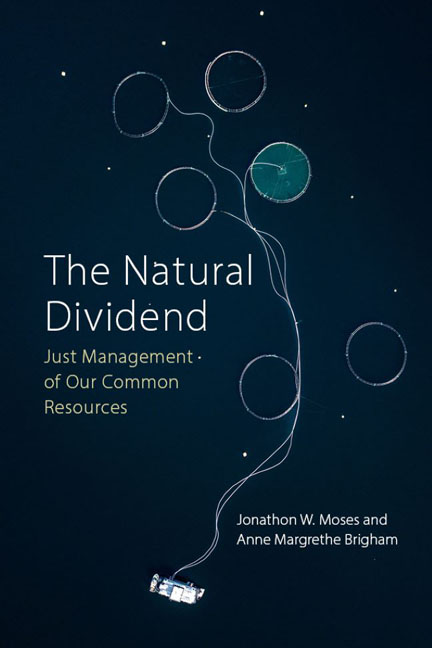Book contents
- Frontmatter
- Dedication
- Contents
- Acknowledgements
- Abbreviations
- 1 Introduction
- 2 Who owns the sun?
- 3 The Natural Dividend
- 4 The earth: the market for land
- 5 The sea: the market for salmon
- 6 The sky above: the market for renewable energy
- 7 The earth beneath: the market for fossil and mineral resources
- 8 A common market? The market for global resources
- 9 Conclusion
- References
- Index
3 - The Natural Dividend
Published online by Cambridge University Press: 20 January 2024
- Frontmatter
- Dedication
- Contents
- Acknowledgements
- Abbreviations
- 1 Introduction
- 2 Who owns the sun?
- 3 The Natural Dividend
- 4 The earth: the market for land
- 5 The sea: the market for salmon
- 6 The sky above: the market for renewable energy
- 7 The earth beneath: the market for fossil and mineral resources
- 8 A common market? The market for global resources
- 9 Conclusion
- References
- Index
Summary
The previous chapter presented two arguments. First, we argued that nature, before it is commodified, belongs to us in common, and that the value it produces – nature's gift – also belongs to the commons. Second, we argued that significant market value is created by political authority when it encloses, allocates and facilitates the commodification of nature.
This chapter extends that argument by elaborating on how nature's gift and its management regime generate value in the form of various rents, which together constitute a Natural Dividend. Politically challenging it may be, but it is not technically difficult to secure the Natural Dividend: political authorities need only to do two things. First, they must establish a management regime that recognizes that these natural resources belong to the commons and allocates access to these resources on its behalf. This management regime sets the scope and the distribution of access to the resources (and, hence, their potential value). Second, political authorities need to employ a variety of policy instruments that can secure the Natural Dividend for the public good, and ensure it is not taken. This Divided can be secured in either a political or economic form, and each form employs a different set of instruments.
The Natural Dividend is what economists refer to as a resource rent, which is itself derived from the scarcity (both natural and induced) of natural resources. In particular, the Natural Dividend consists of three component rents: a differential rent; a regulatory rent; and a locational rent. We elaborate on the nature of each of these component rents in subsequent chapters, as they tend to vary in importance across resource types: in Chapter 4 we introduce differential rents; in Chapter 5 we introduce regulatory rents; and in Chapter 6 we discuss locational rents.
This chapter explains the nature of resource rents, in general, and how they can be secured by political authorities. To do this, the chapter is divided into two main parts. The first part introduces the general literature on resource rents and the two main ways by which natural resources are made scarce (and valuable): by way of nature and/or regulation. Although nature can produce a differential rent all on its own, political authorities can produce a regulatory and/or locational rent (or some combination of the two) when they regulate or provide access to that nature.
- Type
- Chapter
- Information
- The Natural DividendJust Management of our Common Resources, pp. 49 - 76Publisher: Agenda PublishingPrint publication year: 2023



